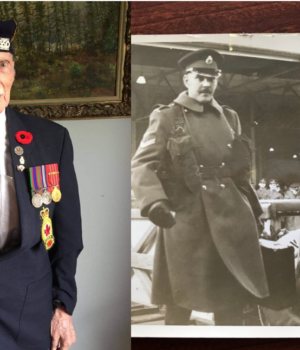Doris Reaney, Submitter
Originally published in the Caressant Care Connections for November 2020, a newsletter for the Caressant Care Retirement Home
Edited to reflect formatting changes
COBDEN – In the fall of 1943, a young Ed Stairs left his home in New Brunswick to join the Royal Canadian Air Force.
“I wanted to do my part and serve my country,” says Ed. “I was sent to
Winnipeg where I was trained in radio and radar tracking. Then, I was
deployed to Kingston, Ontario to become part of The Royal Canadian
Corps of Signals to learn Japanese codebreaking. You had to have
good hearing and common sense. Once I finished the course it was
1945 and I was sent to the West Coast.”
Once deployed to British Columbia, Ed eagerly awaited his mission aboard a US navy ship that would patrol the West Coast between Seattle and Vancouver listening for Japanese communication.
But on August 6, 1945, everything changed.
“I was ready to go aboard my ship then we heard that something big had happened and our mission was scrubbed. I was confused. I didn’t know what had happened or why we were no longer needed after all that training. Then we learned that Japan had been bombed by the United States. There was nothing more for us to do. Japan surrendered days later after a second nuclear bomb was dropped on Nagasaki.”
Ed went from being a trained codebreaker to air traffic control at Comox Airport on Vancouver Island.
“I worked to guide planes that were flying up and down the West Coast. Then that ended and I was faced with no job, no home and an uncertain future.”
Ed was given the opportunity to continue with the Canadian Armed Forces Reserves. He took advantage of a program that paid for vets to go to university. “I studied forestry and ended up working for Ontario Hydro for a number of years
running power lines. When I got married in Cobden, I decided to go back to the air force. I was given the opportunity to work for the RCAF
Institute of Aviation Medicine where I helped to train pilots to fly jets.”
During the 1950s and 60s RCAF auxiliary squadrons were based at the Eglinton Hunt Club to defend Toronto during the Cold War. The
RCAF Staff School, later the Canadian Forces Staff School, occupied the site from 1960 – 1994 educating over 10,000 military officers prior
to closure June 30th 1994.
Just turned 96 in October, Ed is father to four children and granddad to four grandchildren. He has been living at Caressant Care Cobden for 10 years when he moved in with his wife, now sadly deceased. Ed is proud to be an active member of
the local Royal Canadian Legion. “I have been a member for 38 years.”
Bill Maltby is another Cobden Retirement Home Resident who served is country. He was born in Chatham, Ontario.
“I decided to go into the army, because it was a job and there were no jobs to be found at that time in my life.” This was after World War II had ended.
“I was 23 years old when I enlisted in the Canadian Armed Forces. I can remember you needed to get up and get at it in the morning. You
had to clean and dress up in uniform for morning inspection and off to the field where they would do drills and role play for a real war.”
Bill spent time in Germany as a peacekeeper in the early 1950s.
After the army, I worked in a veneer plant where I spent most of my working life until I retired.”
“I have been at Caressant Care Cobden for around three years. I like it here. The folks are good to me.”
We thank Ed, Bill and all the vets for their service to our country.







![Kenopic/Smith Auction [Paid Ad]](https://whitewaternews.ca/wp-content/uploads/2018/10/advertising-100x75.jpeg)

